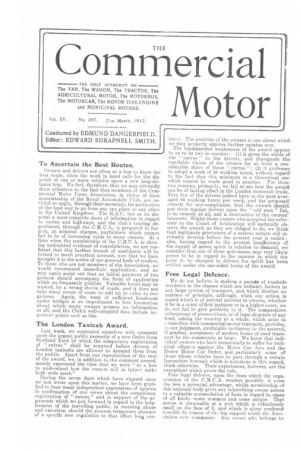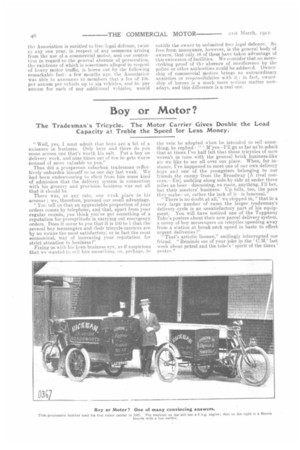To Ascertain the Best Routes.
Page 1

Page 2

If you've noticed an error in this article please click here to report it so we can fix it.
Owners and drivers are often at a los.s to know the best route, when the work in hand calls for the dis patch of one or more vehicles upon a new long-dis tance trip. We feel, therefore, that we may advisedly draw attention to the fact that members of the Com mercial Motor Users Association, in virtue of their associatoship of the Royal Automobile Club, are entitled to apply, through their secretary, for particulars of the best way to go from any one place to any other in the United Kingdom. The R.A.C. has at its disposal a most-complete .store of information in regard to routes and highways and the club's touring department, through the o.M.U.A., is prepared to furnish, at nominal charges, particulars which cannot fail to be of increasing value to many owners, At a time when the membership of the C.M.U.A. is showing undoubted evidence of consolidation, we are confident that this further branch of usefulness will be turned to much practical account, now that we have brought it to the notice of our general body of readers. To those vvho are not members of the Association, we would recommend immediate application, and we may again point out that an initial payment of two guineas should accompany the form of application which we frequently publish. Valuable hours may be wasted, by a wrong choice of roads, and it does not take many errors of route to add up in value to two guineas. Again, the want of sufficient headroom under bridges is an impediment to free locomotion about which many owners possess no information at all, and the Club's well-compiled data include important points such as this.
The London Taxicab Award.
Last week, we contented ourselves with comment upon the urgent public necessity of a new Order from Scotland Yard by which the compulsory registration of " extras" shall be required before drivers of London taxicabs are allowed to demand them from the public. Apart from our reproduction of the text of the award, we, in addition to the comment named, merely expressed the view that we were " at a loss to understand how the owners will in future make both ends meet."
During the seven days which have elapsed since we last wrote upon this matter, we have been gratified to hear many independent expressions of opinion in confirmation of our views about the compulsory registration of " extras," and in support of the arguments which we put forward in regard to the helplessness of the travelling public, in resisting abuse and extortion, should the present temporary absence of a specific new regulation to that effect long con
tinue. The position of the owners is one about which we may properly express further opinion now. The fundamental weaknesses of the award appearto us to be two in number : (I) it gives the whole of the " extras " to the drivers, and disregards the equitable claims of the owners for at least a considerable share of those " extras " ; (2) it professes to adopt a week of 66 working hours, without regard to the fact that this minimum is a theoretical onewhich cannot be made good in practice. For these two reasons, primarily, we fail to see how the aware can be of lasting effect in the London motorcab trade._ Very few of the drivers indeed have in the past averaged 66 working hours per week, and the proposed remedy for non-compliance, that the owners should put their regular drivers upon the " odd man list, is no remedy at all, and is destructive of the owners interests. Whilst those owners who accepted the reference to the Court of Arbitration will naturally observe the award, as they are obliged to do, we think that legitimate grievances of a serious nature will in evitably develop before the present year is ended i ;.
also, having regard to the present insufficiency of
the supply of motor spirit in relation to demand, we consider that one of those grievances may very likely prove to be in regard to the manner in which the price to be charged to drivers for spirit has been settled under the one-sided terms of the award.
Free Legal Defence.
We do not believe in making a parade of roadside incidents in the classes which are ordinary factors inb any large system of transport, and which disclose no. matters of principle, although, when any action is raised which is of general interest to owners, whetherit be in a court of first instance or in a higher court, we do not fail to give publicity to it. The comparative infrequency of prosecutions, or of legal disputes of any kind, taking the country as a whole, which arise in ft3nnection with commercial-motor transport, provides, ia our judgment, irrefutable testimony to the assured, if gradual, acceptance of modern forms of road transport by the community at large. We know that individual owners who have occasionally to suffer for technical offenc?s against the Motor Car Acts and the Heavy Motor Car Order, and particularly some of those whose vehicles have to pass through a certain:. Lancashire borough which is notorious in this regard, think otherwise. Their experiences, however, are the exceptions which prove the rule.
Free legal defence, upon the lines which the organization of the C.M.1.7.A. renders possible, is none the less a potential, advantage, whilst membership of this national body gives any subscribing owner access to a valuable accumulation of facts in regard to cases of all kinds—some common and some unique. That access is obtainable at a cost which is ridiculously small on the face of it, and which is alone rendered
possible by reason of big support which the Association now commands. Any owner who belongs to the Association is entitled to free legal defence, twice in any one year, in respect of any summons arising from the use of a commercial motor, and our contention in regard to the general absence of persecution, the existence of which is sometimes alleged in respect of heavy motor traffic, is borne out by the following remarkable fact: a few months wzo. the Association was able to announce to members that a fee of 10s, per annum per vehicle up to six vehicles, and 5s. per annum for each of any additional vehicles, would
entitle the owner to unlimited free legal defence. So free from annoyance, however, is the general body of owners, that only 16 of them have taken advantage of this extension of facilities. We consider that no morestriking proof of the absence of interference by the police or other authorities could be adduced, Ownership of commercial motors brings no extraordinary anxieties or responsibilities with it ; in fact, ownership of horses is a much more serious matter nowadays, and this difference is a real one.




















